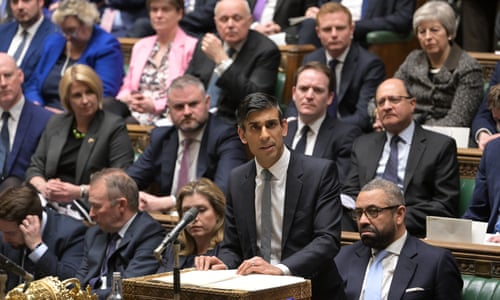Rishi Sunak has hailed a “new chapter” in the UK’s relationship with the EU as he secured a deal to end the long-running dispute over the post-Brexit Northern Ireland protocol.
The prime minister and Ursula von der Leyen, president of the European Commission, described a “decisive breakthrough” at a joint news conference in Windsor after four months of intense negotiations.
During a carefully choreographed announcement that appeared to leave hardline Brexiters more isolated, Sunak claimed the changes would allow the UK “take back control”.
“Today’s agreement is written in the language of laws and treaties. But really it’s about much more than that,” he said. “It’s about stability in Northern Ireland. It’s about real people and real businesses. It’s about showing that our union that has lasted for centuries can and will endure.”
The deal, labelled the “Windsor framework”, goes further than previously expected by giving the UK government an “emergency brake” on new EU laws applied in Northern Ireland if politicians in the province object to them. Von der Leyen stressed this was an “emergency mechanism” and the European court of justice would have the final say on single market issues.
The agreement will create a new green lane for traders, scrapping all trade restrictions between Great Britain and Northern Ireland and new freedoms for medicines, chilled meats and pets to move over the Irish Sea. It also re-writes parts of the existing protocol to allow Westminster to set VAT rates in Northern Ireland.
The deal was welcomed by the main UK opposition parties – with the Labour leader, Keir Starmer, saying that while it was “not perfect” he understood there was an obligation to make it work – as well as many Conservative MPs who have been desperate for the prime minister to resolve the dispute before the next general election.
However, Sunak still faces discord from the hardline Brexiter wing of his party amid concerns over the continued role of EU law in Northern Ireland. Government insiders believe he can limit any rebellion to about 20 Tory MPs when the Commons is eventually given a vote, not expected to be this week.
The DUP leader, Sir Jeffrey Donaldson, said it was “clear that significant progress had been secured across a number of areas” which “vindicated the Democratic Unionist party’s year-long boycott of power-sharing in protest against the protocol”.
However, there were concerns among some hardliners with Ian Paisley, the DUP MP, saying that the Windsor framework “does not cut the mustard” and provided no basis for the party to go back into power-sharing in Stormont.
Stephen Farry, of Northern Ireland’s Alliance party, said it broadly welcomed the agreement but had “massive concerns over the Stormont break”. He told the prime minister: “There are real dangers that this process could add more instability into the assemble.”
Boris Johnson, who negotiated the original protocol in 2020 despite all the problems it created on the ground in Northern Ireland, was understood to be studying and reflecting on the proposals. However, he was said to have urged the DUP to be cautious about the plan.
The former prime minister’s controversial legislation to override post-Brexit rules on Northern Ireland, on ice in the House of Lords, was dumped by Sunak after he negotiated the new deal. Johnson had warned his successor that scrapping the legislation would be a “great mistake”, but Sunak said there was no longer legal justification for the bill.
The Guardian reported last month that the attorney general, Victoria Prentis, had warned the bill was likely legally unsound because of the progress of the negotiations – and the “doctrine of necessity” no longer applied in order to give cover to override international law.

In advance of the announcement in Windsor, which took place underneath a portrait of the late Queen, Von der Leyen’s arrival was overshadowed by an extraordinary row over the role of King Charles in the final deal – who had tea with the EU leader in Windsor Castle after it was sealed.
Both Buckingham Palace and No 10 sought to place the responsibility on each other, but the meeting angered Tory Brexiters and some senior figures in the DUP who claimed that it risked dragging the king into a divisive political issue.
The DUP’s former first minister Arlene Foster said it was “crass and will go down very badly in Northern Ireland” but the Labour MP Chris Bryant also raised concerns, saying it was a “terrible mistake from the government – we should never bring the monarchy into political disputes”.
Both leaders emphasised a step-change in the relationship between the UK and the EU, with Von der Leyen addressing the prime minister as “Dear Rishi” and saying she had taken “a great sense of satisfaction” in building a new constructive partnership.
Von der Leyen hinted that the deal would open the door to a closer and more constructive relationship with the EU including, as its first steps, closer participation to Brussels programmes, as well as working together on Ukraine and the climate crisis.Rishi Sunak renounces Northern Ireland protocol in praise of new agreement with EU – video
The Windsor framework will create a new green lane for traders, scrapping all trade restrictions between Great Britain and Northern Ireland, and new freedoms for medicines, chilled meats and pets to move over the Irish Sea.
It involves the re-writing of parts of the protocol, something the prime minister pointed out the EU said it would never do during negotiations with his predecessors and David Frost, the former Brexit negotiator.
Key for consumers is the elimination the border in the Irish sea for consumers goods sold in supermarkets, consumed in canteens or bought online with checks and customs.
In what as seen as the most radical change to the protocol, a new mechanism, dubbed the Stormont brake, will give the UK a veto on any to EU laws applying to trade in Northern Ireland.
It is based on a mechanism in the Good Friday Agreement known as the petition of concern, which allows a group of at least 30 members of the legislative assembly to block new laws unless they have cross-community consent.
The deal also gives the UK the power to set its own VAT, alcohol tax and state aid rules and clears the way for a permanent solution to the issue of medicine supply in Northern Ireland allowing drugs authorised by British regulatory authorities to be supplied to the NHS in Northern Ireland.
If the deal is ratified in London and Brussels, the Northern Ireland protocol will fall away. Von der Leyen said the EU would also start the process of ratifying the UK’s associate membership of the Horizon Europe £85bn flagship science research programme which the UK has been frozen out of in a tit-for-tat retaliation by the EU.
As the same time the EU will drop the seven EU infringement proceedings launched after the UK’s decision to unilaterally dis-apply the protocol in 2021 and table the Northern Ireland protocol bill.
The Irish government has welcomed the protocol deal as a “new chapter” in relations between the EU and UK and an opportunity to end Northern Ireland’s political vacuum.
The taoiseach, Leo Varadkar, said the agreement, if implemented, would bring stability and certainty to a situation that has been in flux. It should strengthen relations between Dublin and London and pave the restoration of power-sharing in Northern Ireland, he told a news conference.
Ireland’s foreign minister, Micheál Martin, said the deal opened a “new chapter” for the EU and UK, who he said were natural partners in addressing global challenges from Ukraine to the climate crisis. “It is in Ireland’s interests that the EU and the UK have a positive, forward-looking relationship.”
The deal also seemingly won the approval of Joe Biden, who called the agreement an “essential step to ensuring that the hard-earned peace and progress of the Belfast/Good Friday Agreement is preserved and strengthened”.
Guardian





















































